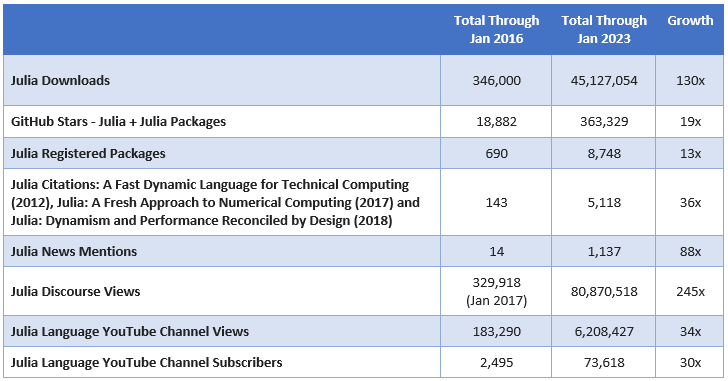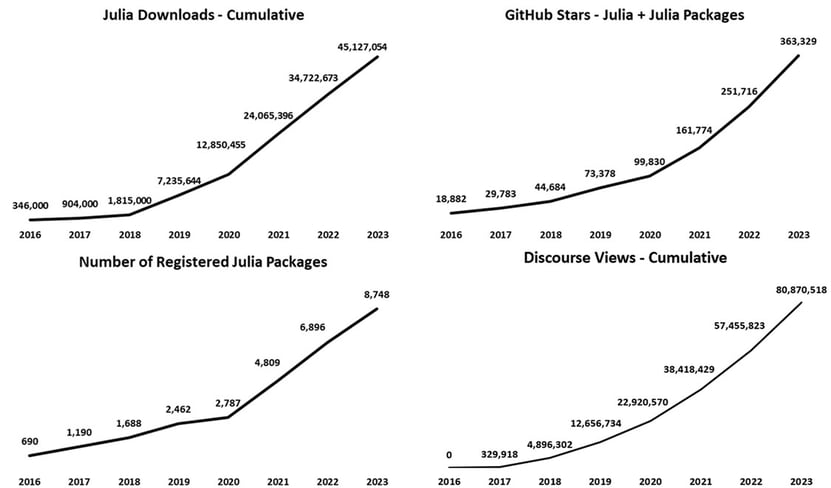Annual Julia Growth Statistics - January 2023
Julia use continues to grow rapidly.


Free Webinars from JuliaHub: Please register today for these free Webinars from JuliaHub.
-
JuliaHub Demo - Wednesday February 8, 1:30-2:30 pm Eastern (US): Register for this free JuliaHub demonstration, including access to more than 8,000 Julia packages, an integrated development environment, datasets, file management, Pluto notebooks, version control, access to CPU and GPU configurations, logs and monitoring solutions. This Webinar is also available on Thursday February 23 at the same time.
-
Modeling and Simulation with Dyad (Formerly JuliaSim) - Tuesday February 15, 12-1 pm Eastern (US): Register for this free Dyad (Formerly JuliaSim) Webinar with Dr. Chris Rackauckas, JuliaHub Director of Modeling and Simulation. This Webinar includes ModelingToolkit.jl, Dyad ModelOptimizer, Dyad Controls, Dyad Functional Mockup Units (FMUs), new solver improvements and more.
-
JuliaHub Demo - Thursday February 23, 1:30-2:30 pm Eastern (US): Register for this free JuliaHub demonstration. The agenda is the same as the February 8 Webinar, including access to more than 8,000 Julia packages, an integrated development environment, datasets, file management, Pluto notebooks, version control, access to CPU and GPU configurations, logs and monitoring solutions.
-
JuliaHub 6.0 Features - Monday February 27, 10:30-11:30 am Eastern (US): Register for this free Webinar. JuliaHub 6.0 includes a number of new features: better support for Pluto notebooks, a new interface for the JuliaHub Drive and a new interface to interact with JuliaHub DataSets (powered by DataSets.jl) that you can host on JuliaHub to enable collaboration and reproduction of your Julia pipelines.
Dyad Videos: JuliaHub has published four new videos explaining Dyad (Formerly JuliaSim) and its uses. All four are available for free on YouTube.
-
Density Functional Theory Surrogates with Dyad (Formerly JuliaSim)
-
System Identification for Model-Predictive Control Using Dyad (Formerly JuliaSim)
Why Julia? - JuliaHub Chief Scientist Alan Edelman: MIT Professor Alan Edelman (JuliaHub Chief Scientist and co-founder, Julia co-creator) will present Why Julia? at the University of Florida Herbert Wertheim College of Engineering in Gainesville, Florida. The presentation takes place on Tuesday, January 31 from 12-1 pm at Computer Sciences and Engineering (CSE) Room 404.
JuliaCon 2023: JuliaCon 2023 will be in person for the first time since 2019, and will be held at MIT for the first time since 2016. JuliaCon will take place July 24-29. Sign up here to be notified when tickets are available.
Geospatial Data in Julia with Rasters.jl: Ayush Patnaik presented Geospatial Data in Julia with Rasters.jl during an event in Mumbai sponsored by JuliaHub and XKDR. The presentation, tutorials, notebook and Rasters.jl are all available online.
Introduction to Julia for Data Science at MIT: Bogumił Kamiński, Łukasz Kraiński, Przemysław Szufel, Bartosz Witkowski, Sebastian Zając, Mateusz Zawisza conducted a four-day short course at MIT, Introduction to Julia for Data Science from Jan 17-20. This course was supported by the Polish National Agency for Academic Exchange.
Dyad Model Optimizer: Orestis Ousoultzoglou has published a detailed blog post about the Dyad (Formerly JuliaSim) Model Optimizer. Click here for more information.
Julia for Earth Observation: The Atlantic International Research (AIR) Centre hosted a conference on JuliaEO: Global Workshop on Earth Observation with Julia in the Azores from Jan 9-13. Click here for more information.
Julia for Fighting Fires: A new paper in Nature (Scientific Reports) describes how Julia, including Flux.jl, is used to forecast seasonal fires and map tropical peatland hydrology in Riau, Sumatra in Indonesia. The article, Accuracy of Tropical Peat and Non-Peat Fire Forecasts Enhanced by Simulating Hydrology is co-authored by researchers from Canada (University of Alberta), the UK (Swansea University and University of Manchester) and Indonesia (Universitas Gadjah Mada. More information is available here.
Julia for Physics-Embedded Inverse Analysis: A new paper in Nature (Scientific Reports) describes how Julia, including GaussianRandomFields.jl, is used for physics-embedded inverse analysis. The article, Physics-Embedded Inverse Analysis with Algorithmic Differentiation for the Earth’s Subsurface, is co-authored by researchers from Los Alamos National Laboratory and MIT. The article is available here.
Julia for History: A new paper in Nature (Human Behavior) uses Circuitscape in Julia to model The Transmission of Pottery Technology Among Prehistoric European Hunter-Gatherers. The co-authors represent more than 20 different institutions, including the British Museum and the Hermitage, and 10 countries (UK, Russia, Estonia, Germany, Poland, Ukraine, Czech Republic, Belarus, Latvia and Lithuania). More information is available here.
Julia for Biomolecular Analysis: A new paper in Nature (Scientific Reports) uses Flux.jl for End-to-End Differentiable Blind Tip Reconstruction for Noisy Atomic Force Microscopy Images. The co-authors represent Kyoto and Saitama Universities in Japan. More information is available here.
Metaheuristics Using Julia: Metaheuristics.jl provides high-performance metaheuristics for global optimization. Click here for more.
Web Development Using Julia: Web Development with Julia and Genie is a new book by Dr. Ivo Balbaert and Adrian Salceanu. Click here for more information.
Predictive Analytics Course Using Julia: Predictive Analytics: Regression and Classification by Professor Sourish Das (Chennai Mathematical Institute) using Julia, Python and R is available free online. Click here for more information.
Converting from Proprietary Software to Julia: Are you looking to leverage Julia’s superior speed and ease of use, but limited due to legacy software and code? JuliaHub and our partners can help accelerate replacing your existing proprietary applications, improve performance, reduce development time, augment or replace existing systems and provide an extended trusted team to deliver Julia solutions. Leverage experienced resources from JuliaHub and our partners to get your team up and running quickly. For more information, please contact us.
Careers at JuliaHub: JuliaHub is a fast-growing tech company with fully remote employees in 12 countries on 5 continents. Click here to learn more about exciting careers and internships with JuliaHub.
Julia and JuliaHub in the News
-
IT Jungle: Is Julia Coming to IBM i Next?
-
Analytics Insight: Python vs Julia: Which Programming Language Should Statisticians Learn in 2023?
-
Analytics Insight: Create Your Own ChatGPT! Use These Top 10 Programming Languages
-
Nature: Accuracy of Tropical Peat and Non-Peat Fire Forecasts Enhanced by Simulating Hydrology
-
TimesTech: Five Skills You Need, If You Want to Build Career In AI
-
Nature: Physics-Embedded Inverse Analysis with Algorithmic Differentiation for the Earth’s Subsurface
-
HackerNoon: “Python Is Slow” and Other Myths of a Dying Era
-
Analytics Insight: Top 10 Reliable AI-Driven Tools for Your Software Development Process
-
Nature: The Transmission of Pottery Technology Among Prehistoric European Hunter-Gatherers
-
MarkTechPost: Top Artificial Intelligence (AI) Tools That Can Generate Code To Help Programmers
-
CXO Today: Want to Build A Career In AI? Here Are The Five Skills You Need!
-
Digital Journal: Data Scientist vs Machine Learning Engineer: A Career Comparison in 2023
-
Nature: End-to-End Differentiable Blind Tip Reconstruction for Noisy Atomic Force Microscopy Images
-
TheNextWeb: Why TensorFlow for Python Is Dying a Slow Death
-
KDNuggets: Setup and Use JupyterHub (TLJH) on AWS EC2
Julia Blog Posts
-
My Journey from R to Julia (Dr. Tomás Aragón)
-
Dyad (Formerly JuliaSim) Model Optimizer (Orestis Ousoultzoglou)
-
Flux.jl Is So Flexible - Deep Learning in Julia (Anshuman Mishra)
-
The 10 Best Julia Resources All Programmers Should Read (Logan Kilpatrick)
-
Here’s How NASA Is Using Julia to Better Understand the Ocean (Logan Kilpatrick)
-
Local Binary Pattern Features for Texture Classification (Muhammad Ardi)
-
Handling Side Effects in Unison (Erik Engheim)
-
Welcome to DuckDB (Bogumił Kamiński)
-
Investigating P-Values in Hypothesis Tests (Bogumił Kamiński)
-
Flea Circus for the New Year Celebration (Bogumił Kamiński)
-
'Introduction to Julia for Data Science' Course at MIT (Bogumił Kamiński)
-
TableMetadataTools.jl (Bogumił Kamiński)
-
Should Web Developers Be Flocking to Julia? (Emmett Boudreau)
-
Julia Pong! Multiplayer Pong in Julia (Emmett Boudreau)
-
Julia Pong Game II: Collision and Gameplay (Emmett Boudreau)
-
7 Awesome Multiple Dispatch Tricks for Julia (Emmett Boudreau)
-
Experimenting with SVG Game Development in Julia (Emmett Boudreau)
-
Julia 1.9: The Programming Language of 2023 (Emmett Boudreau)
-
EmTask: Building a Task Organizer in Julia (Emmett Boudreau)
-
Using Methods to Change Methods in Julia (Emmett Boudreau)
-
The A|B Test and Gaining Insights (Emmett Boudreau)
-
Overhauling Olive Cells! (Emmett Boudreau)
-
Using Method Signatures To Display In Julia (Emmett Boudreau)
-
Show And Display In Julia: Full Overview (Emmett Boudreau)
-
Conformal Prediction Intervals for any Regression Model (Patrick Altmeyer)
-
Statistical Plotting with Julia: VegaLite.jl (Roland Schätzle)
-
How to Read, Write and Display Images in Julia Using FileIO.jl, ImageView.jl (Ashwani Rathee)
-
How to Quickly Turn Your Julia Code into a Web App with Genie Builder (Pere Giménez)
-
Convolution in the Form of a Binary Infix Operator (Steven Siew)
-
Splitting and Joining Strings to Translate Morse Code (Julia Geek)
-
Tuple Transpose (Neven)
-
Make Beautiful Web Apps with... Dash.jl (Mathieu Aucejo)
-
MultilayerGraphs.jl (v1.1): Multilayer Network Science in Julia (Claudio Moroni and Pietro Monticone)
-
Asynchronous Workflow Using Julia Tutorial (Jacob Zelko)
Upcoming Julia and JuliaHub Events
-
Gainesville: Why Julia? with MIT Professor Alan Edelman (JuliaHub Chief Scientist and co-founder, Julia co-creator) at University of Florida College of Engineering Jan 31
-
Online: JuliaHub Demo Feb 8
-
Online: Modeling and Simulation with Dyad (Formerly JuliaSim) with Dr. Chris Rackauckas (JuliaHub Director of Modeling and Simulation Feb 14
-
Online: JuliaHub Demo Feb 23
-
Online: JuliaHub 6.0 Features Feb 27
-
Cambridge, MA: JuliaCon 2023 July 24-29
Recent Julia and JuliaHub Events
-
Mumbai: Julia Meetup with Dr. Viral Shah (JuliaHub), Ajay Shah (XKDR) and Ayush Patnaik (XKDR) with XKDR Mumbai Jan 3
-
Azores: JuliaEO: Global Workshop on Earth Observation with Julia with Atlantic International Research (AIR) Centre Jan 9-13
-
Bangalore: Pluto.jl and JavaCall.jl Julia Meetup with Avik Sengupta (JuliaHub VP of Engineering) and Panagiotis Georgakopoulos (JuliaHub Software Engineer) at JuliaHub Bangalore Jan 10
-
Cambridge, MA: Introduction to Julia for Data Science with Bogumił Kamiński, Łukasz Kraiński, Przemysław Szufel, Bartosz Witkowski, Sebastian Zając and Mateusz Zawisza at MIT Jan 17-20.
-
Cambridge, MA: Introduction to Quantum Computing with Julia on AWS with Katie Hyatt and Algorithms for Generation of Synthetic Networks with Community Structure in Julia with Bogumił Kamiński and Cambridge Area Julia Users Network (CAJUN) at MIT Jan 19
Contact Us: Please contact us if you want to:
-
Learn more about JuliaHub, Dyad (Formerly JuliaSim), Pumas, PumasQSP or CedarEDA
-
Obtain pricing for Julia consulting projects for your organization
-
Schedule online Julia training for your organization
-
Share information about exciting new Julia case studies or use cases
-
Spread the word about an upcoming online event involving Julia
-
Partner with JuliaHub to organize a Julia event online
-
Submit a Julia internship, fellowship or job posting
About JuliaHub and Julia
JuliaHub is a fast and easy-to-use code-to-cloud platform that accelerates the development and deployment of Julia programs. JuliaHub users include some of the most innovative companies in a range of industries including pharmaceuticals, automotive, energy, manufacturing, and semiconductor design and manufacture.
Julia is a high performance open source programming language that powers computationally demanding applications in modeling and simulation, drug development, design of multi-physical systems, electronic design automation, big data analytics, scientific machine learning and artificial intelligence. Julia solves the two language problem by combining the ease of use of Python and R with the speed of C++. Julia provides parallel computing capabilities out of the box and unlimited scalability with minimal effort. Julia has been downloaded by users at more than 10,000 companies and is used at more than 1,500 universities. Julia co-creators are the winners of the prestigious James H. Wilkinson Prize for Numerical Software and the Sidney Fernbach Award.
About the Author

JuliaHub
Discover key content authored by JuliaHub experts. Stay updated on innovative practices in scientific and technical computing.


.jpg)
